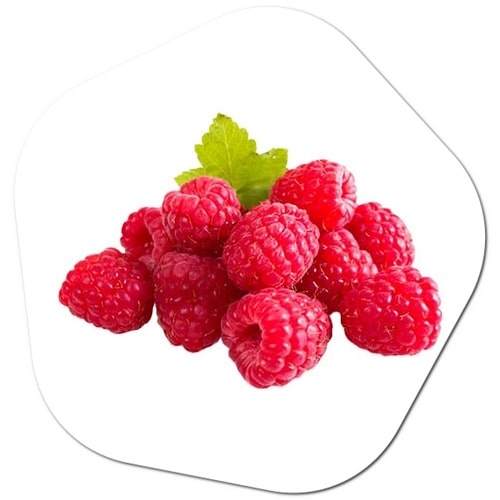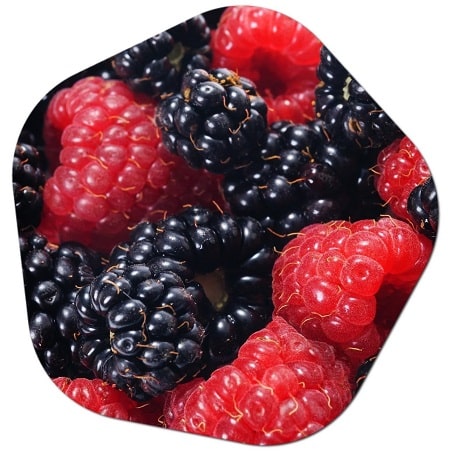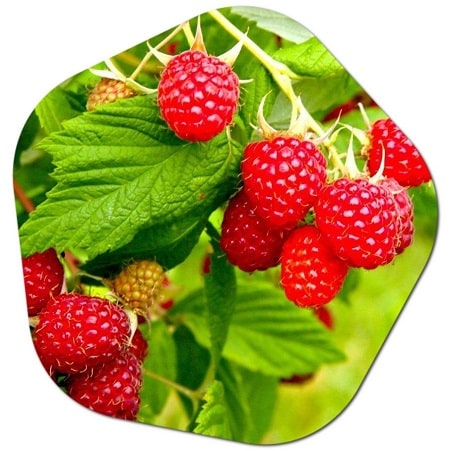What is Raspberry? Botanical Information: It is a shrubby, thorny plant like blackberries. It is in clusters. It grows spontaneously. Fruit; similar to mulberry. It is yellowish red orange, juicy and fragrant. Fruits are collected and dried. Jam, syrup and liqueur are made. It is also eaten as a fruit. Raspberry Composition : Protein, carbohydrate, cellulose, provitamin A, vitamin C, apple and lemon acid, sepi substances, etheric oil, vitamin P, calcium, magnesium, phosphorus, iron, manganese and copper compound acids, purine substances, reletin.
It is generally okay to eat raspberries every day as part of a balanced diet. Raspberries are a nutritious fruit that can be a healthy addition to your daily meals and snacks. They are low in calories and high in fiber, vitamins (especially vitamin C), minerals, and antioxidants, which can provide several health benefits, including:
Antioxidant Protection: Raspberries are rich in antioxidants like quercetin, anthocyanins, and ellagic acid, which can help protect your cells from oxidative damage and reduce the risk of chronic diseases.

Heart Health: The fiber and potassium in raspberries can contribute to heart health by helping to lower blood pressure and cholesterol levels.
Weight Management: Raspberries are low in calories and high in fiber, which can help you feel full and satisfied, potentially aiding in weight management.
Digestive Health: The fiber in raspberries supports a healthy digestive system by promoting regular bowel movements.
Blood Sugar Control: The fiber and antioxidants in raspberries may help stabilize blood sugar levels, which can be beneficial for individuals with diabetes or those at risk of developing it.
Skin Health: The antioxidants in raspberries may help protect your skin from damage caused by UV rays and aging.
Eye Health: Some of the compounds in raspberries, like vitamin C and antioxidants, may contribute to eye health and reduce the risk of eye-related conditions.
Immune Support: Vitamin C in raspberries is known to boost the immune system and help the body fight off infections.
While raspberries are a nutritious fruit, it’s important to maintain a balanced diet that includes a variety of foods to ensure you get a wide range of nutrients. Also, consider any personal dietary restrictions or allergies you may have. If you have specific health concerns or conditions, it’s always a good idea to consult with a healthcare professional or registered dietitian who can provide personalized advice on your diet. What is the best benefit of raspberry fruit? >>
Why are raspberries a Superfood?
The term “superfood” is not a scientific classification but rather a marketing term used to describe foods that are particularly rich in nutrients and believed to offer various health benefits due to their nutritional density. Raspberries are often considered a superfood because they are packed with a wide range of nutrients and bioactive compounds that have been associated with several health benefits. Here are some reasons why raspberries are often referred to as a superfood:
- Rich in Antioxidants: Raspberries are loaded with antioxidants, including vitamin C, quercetin, anthocyanins, and ellagic acid. Antioxidants help protect the body’s cells from oxidative damage caused by free radicals, potentially reducing the risk of chronic diseases such as cancer, heart disease, and age-related conditions.
- High in Fiber: Raspberries are an excellent source of dietary fiber, which is essential for digestive health. Fiber helps maintain regular bowel movements, supports a feeling of fullness, and may contribute to weight management.
- Vitamin and Mineral Content: Raspberries are a good source of essential vitamins and minerals, including vitamin C, vitamin K, potassium, manganese, and folate. These nutrients play various roles in maintaining overall health, including immune support, bone health, and blood pressure regulation.
- Low in Calories: Raspberries are relatively low in calories, making them a nutritious choice for those looking to maintain or lose weight while still enjoying a sweet treat.
- Potential Heart Health Benefits: The fiber, antioxidants, and potassium in raspberries can contribute to heart health by helping to lower blood pressure, reduce cholesterol levels, and support overall cardiovascular function.
- Cancer-Fighting Potential: Some studies suggest that the ellagic acid and anthocyanins found in raspberries may have anti-cancer properties by inhibiting the growth of cancer cells and reducing inflammation.
- Skin Health: The antioxidants in raspberries may help protect the skin from damage caused by UV radiation and promote a healthy, youthful complexion.
- Blood Sugar Management: The fiber and antioxidants in raspberries may help stabilize blood sugar levels, which can be beneficial for individuals with diabetes or those at risk of developing it.

While raspberries offer many health benefits, it’s important to remember that a balanced diet that includes a variety of foods is key to overall health. There is no single “superfood” that can provide all the nutrients your body needs. Incorporating raspberries, along with other fruits and vegetables, into your diet can contribute to a nutritious and health-promoting eating pattern.
How many raspberries should you eat a day?
There is no specific daily recommended intake of raspberries because individual dietary needs vary based on factors such as age, gender, activity level, and overall dietary choices. However, including raspberries in your diet in moderation as part of a balanced and varied daily intake of fruits and vegetables is generally a good idea. Here are some general guidelines:
- Serving Size: A typical serving size of raspberries is about 1/2 cup (approximately 60-65 grams), which provides around 30-35 calories. This is a reasonable portion to include in a snack or as part of a meal.
- Dietary Variety: It’s essential to have a diverse diet that includes a wide range of fruits and vegetables. While raspberries are nutritious, it’s beneficial to consume other fruits and vegetables to ensure you get a variety of vitamins, minerals, and phytonutrients.
- Individual Needs: Your daily intake of raspberries and other foods should be tailored to your specific dietary needs and goals. If you have dietary restrictions, allergies, or health conditions, you may need to adjust your raspberry consumption accordingly. For personalized dietary advice, consider consulting with a registered dietitian or healthcare professional.
- Balance: While raspberries are a healthy food choice, it’s important not to overconsume any single food, as a balanced diet is key to overall health. Eating a variety of foods from different food groups helps ensure you get a broad spectrum of nutrients.

Remember that raspberries can be enjoyed in various ways, including fresh, frozen, in smoothies, oatmeal, yogurt, or as a topping for salads or desserts. Including them as part of a balanced diet can contribute to your overall nutritional intake and health.
What do raspberries do to your body?
Raspberries can have several positive effects on your body when consumed as part of a balanced diet. Here are some of the ways raspberries can benefit your health:
Provide Antioxidant Protection: Raspberries are rich in antioxidants, including vitamin C, quercetin, anthocyanins, and ellagic acid. Antioxidants help protect your cells from oxidative stress and damage caused by free radicals. This protection may reduce the risk of chronic diseases and slow down the aging process.
Support Heart Health: Raspberries are a good source of dietary fiber, which can help lower cholesterol levels and promote heart health. The potassium content in raspberries may also contribute to maintaining healthy blood pressure.
Aid Digestion: The fiber in raspberries supports digestive health by promoting regular bowel movements and preventing constipation. A healthy digestive system is essential for overall well-being.
Weight Management: Raspberries are relatively low in calories and high in fiber, which can help you feel full and satisfied. This can aid in weight management by reducing overall calorie intake.
Blood Sugar Control: The fiber and antioxidants in raspberries may help stabilize blood sugar levels, which can be beneficial for individuals with diabetes or those at risk of developing it.
Bone Health: Raspberries contain minerals like manganese, which are important for bone health. Adequate manganese intake supports bone density and strength.
Immune Support: Vitamin C, found in raspberries, plays a crucial role in supporting the immune system and helping the body fight off infections.
Skin Health: The antioxidants in raspberries may protect your skin from damage caused by UV rays and environmental factors. They may also contribute to a healthy complexion.
Eye Health: Some of the compounds in raspberries, such as vitamin C and antioxidants, may contribute to maintaining good eye health and reducing the risk of age-related eye conditions.
Potential Cancer Prevention: Some studies suggest that the ellagic acid and anthocyanins in raspberries may have cancer-fighting properties by inhibiting the growth of cancer cells and reducing inflammation.
It’s important to note that while raspberries offer these potential health benefits, they should be part of a well-rounded diet that includes a variety of fruits, vegetables, whole grains, lean proteins, and healthy fats. Eating a diverse range of foods provides a broader spectrum of nutrients needed for overall health. Additionally, individual health outcomes can vary, and it’s always a good idea to consult with a healthcare professional or registered dietitian for personalized dietary recommendations. What raspberries are good for >>
What are the benefits of raspberry fruit?
Raspberries are a highly nutritious fruit that offers several health benefits when incorporated into your diet. Here are some of the key benefits of consuming raspberries: Raspberry benefits
- Rich in Antioxidants: Raspberries are packed with antioxidants, including vitamin C, quercetin, anthocyanins, and ellagic acid. Antioxidants help protect your cells from oxidative damage, reduce inflammation, and may lower the risk of chronic diseases like cancer and heart disease.
- Heart Health: The dietary fiber, potassium, and antioxidants in raspberries can contribute to heart health. Fiber helps lower cholesterol levels, while potassium helps regulate blood pressure, reducing the risk of cardiovascular issues.
- Weight Management: Raspberries are low in calories and high in fiber, making them a filling and nutritious choice for those looking to manage their weight. The fiber content helps you feel full and satisfied, reducing overall calorie intake.
- Digestive Health: The fiber in raspberries promotes healthy digestion by preventing constipation and supporting regular bowel movements.
- Blood Sugar Control: The fiber and antioxidants in raspberries may help stabilize blood sugar levels, which is beneficial for individuals with diabetes or those at risk of developing the condition.
- Bone Health: Raspberries contain essential minerals like manganese, which is important for bone health. Adequate manganese intake supports bone density and strength.
- Immune Support: Raspberries are a good source of vitamin C, which plays a crucial role in supporting the immune system and helping the body fight off infections.
- Skin Health: The antioxidants in raspberries may protect your skin from damage caused by UV rays and environmental factors, potentially contributing to a healthy complexion.
- Eye Health: Compounds like vitamin C and antioxidants in raspberries may contribute to maintaining good eye health and reducing the risk of age-related eye conditions.
- Cancer Prevention: Some studies suggest that the ellagic acid and anthocyanins in raspberries may have cancer-fighting properties by inhibiting the growth of cancer cells and reducing inflammation.
- Anti-Inflammatory Effects: Raspberries’ antioxidants have anti-inflammatory properties that may help reduce inflammation in the body, potentially benefiting various health conditions.
- Hydration: Raspberries have a high water content, which can help keep you hydrated, especially when consumed as part of a fruit salad or smoothie.
It’s important to note that raspberries should be part of a well-balanced diet that includes a variety of fruits, vegetables, whole grains, lean proteins, and healthy fats. Eating a diverse range of foods ensures that you get a wide spectrum of nutrients necessary for overall health. Additionally, individual health outcomes can vary, so it’s advisable to consult with a healthcare professional or registered dietitian for personalized dietary recommendations.

